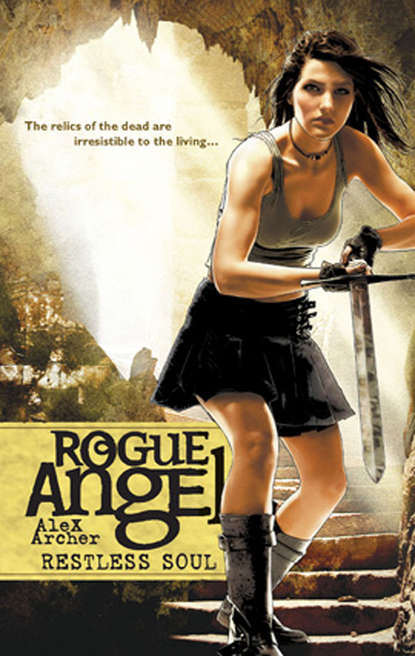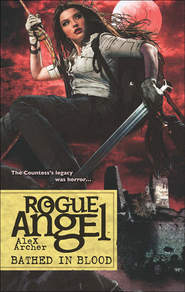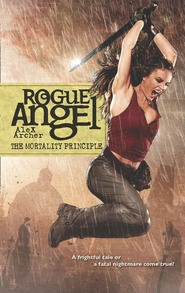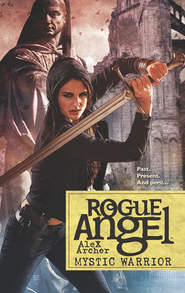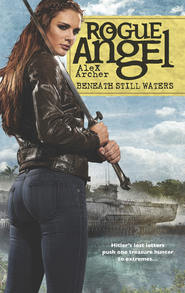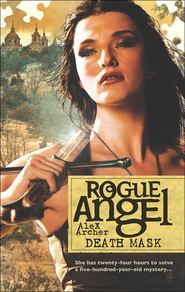По всем вопросам обращайтесь на: info@litportal.ru
(©) 2003-2025.
✖
Restless Soul
Автор
Год написания книги
2019
Настройки чтения
Размер шрифта
Высота строк
Поля
“My sister is terribly claustrophobic,” Luartaro said. He was a few feet behind her.
Annja realized she knew actually little about him; she’d never asked about his family. Now she knew his father was a teacher, and he had at least one sibling.
“My sister…she wouldn’t… What is the American expression?” Luartaro continued.
“Be caught dead in here?” Annja suggested.
“Yes, be caught dead. Here, or in any of the other caves I’ve been to. Still, you’d like her, my sister. I hope you get a chance to meet her. Even though she is claustrophobic, you would get along.”
Caught dead. Annja froze. She felt certain that whatever was bothering her had something to do with death.
Free me.
She twisted in the tiny space, looking left, then right, then back over her shoulder. Was someone there?
Zakkarat kept crawling ahead, dragging the lantern with him, the jostling and sloshing of the base of it in the water sending shadows dancing maniacally across the walls and reflecting off the wet stone. He was careful to keep as much of it out of the water as he could; if it got too wet, it would go out. Fortunately, the lantern had a reflector in it, which made its light fairly bright.
Annja felt an icy jab rise up from her knees. Had she heard something, or was her imagination dancing in time with the shadows.
“Something wrong? Something I said?” Luartaro asked.
“No, Lu,” she said. “Nothing’s wrong.” She hurried to catch up to their guide.
The passage twisted sharply and, for several yards, Annja and Luartaro had to crawl on their stomachs, their packs scraping against the ceiling, their faces just above the water. Then the passage rose again, and they were back to crawling on dry stone.
“It cannot be far now.” Zakkarat’s voice bounced off the walls. “I believe we are near. But it has been too long since I’ve been to this cave. Nothing looks familiar.”
“He’s earning his baht,” Luartaro said. A moment later he added, “I’ve a thought, Annja. He’s taking us to see more of these teak coffins, right?”
She nodded, but realized he couldn’t see her.
“But there’s no way those coffins could have fit through this twisting tunnel. So the ancient Thai people couldn’t have brought them down here. We should have taken the other passage. This is my fault. I suggested we take the downward slope.”
“We’re all in this together,” Annja replied.
A few minutes later they were standing in a chamber that stretched at least thirty yards across and at least twice that high. There was a massive crystal flowstone immediately to their right. It ran nearly the height of the chamber and was dotted with delicate calcite and aragonite crystals.
“This cave,” Zakkarat said, “if it is the cave I am thinking of, is known for two different species of blind cave fish. I read about them in one of my father’s magazines. They share the same river, and one of them is scaleless and colorless and uses fins to walk up the banks. I have a picture of one at home.”
He gestured for them to keep moving. The next cavern was not as physically beautiful, but it contained what they had come to see.
One wall was lined with coffins, and another had larger coffins stacked against it. The air was stale, but clean, and there was no evidence that bats had ever frequented the place. It contained a natural chimney that rose on one end, and Annja would have enjoyed climbing it were it not for the coffins.
“You’re right, Lu. There’s no way the coffins were carried along that tunnel we came through,” Annja said. “All of these coffins had to be brought here another way. They’re massive, some of them. And teak is very heavy. Maybe an earthquake changed the passages through the years. Maybe a rock slide. Caves change. Rivers change them, too.”
“Change, yes. But—” Zakkarat held the lantern in front of him. The light casting up and out haloed his puzzled face. “This is not a part of Ping Yah I remember. I’ve seen coffins, but not these. I’ve not been here before. Perhaps this is not Ping Yah at all. Perhaps we should have taken the other way, and went up. Perhaps that was Ping Yah with the blind cave fish. Not this cave.”
He made a tsk-tsking sound, took his helmet off, scratched his head and put the helmet back on. “But you wanted to see coffins, and there are plenty here.”
“Yes, we wanted to see more coffins,” Annja said softly, gritting her teeth as a wave of cold washed over her.
She stepped to the closest coffin. There were intricate carvings on it, some tugging at her memory, as if she’d seen something similar in a book. She reached into her pocket and pulled out her digital camera. The plastic bag had kept it dry. She took several pictures, and then moved to the next coffin.
What is bothering me? she wondered. Something she couldn’t explain had her feeling very unsettled.
Like the coffins from Tham Lod Cave, these held no bodies. Scientists and explorers who had been there before had likely removed them—if there were any to remove. They may even have taken some coffins, too, for it looked as if there were odd gaps between some of them. There were pots inside some of the coffins, probably heavy by the thickness of the clay. They were intact and looked as if they should be in a museum.
“No, maybe this is not Ping Yah at all,” Zakkarat repeated. “I am so sorry. The rain, not coming out here for some time…so sorry. I should have looked at a map and my father’s notes. I have gotten us lost. Nothing here is familiar to me. I will not charge you so much. We can go back and—”
“I’m not sorry,” Luartaro said. “These are magnificent. You did just fine, Zakkarat.” He let out a low, appreciative whistle and retrieved his own digital camera. “In fact, you did very well.”
Annja’s fingers hovered above the teak. She peered inside and used the flashlight to better illuminate a large coffin’s interior. Though there was no trace of a body, there was evidence one had been there. The wood was slightly discolored in the shape of a prone person.
What were these people like? What was their view of life and death? And did they believe in an afterlife? How a society treated its dead often reflected the extent to which they valued life. Annja was certain the primitive people placed great reverence on life—or at least on the lives of the people they had interred in the cave.
“So very sorry,” Zakkarat repeated, shaking his head. He let his pack slip to the ground. “Should have realized this was the wrong way. These coffins would not have fit in the tunnel we crawled through. We barely fit.”
“Maybe an earthquake changed things.” Luartaro voiced what Annja had said earlier. “There have been earthquakes throughout Thailand and all of Asia. Or maybe—”
“Or maybe they brought the coffins in through there.” Zakkarat pointed halfway up the wall, where a wide cleft in the rock looked like the opening to another passage.
Luartaro took a picture of Zakkarat pointing, and then snapped several of Annja and the wall of large teak coffins.
“Let’s hope that’s a passage,” Annja said. She turned away from the coffins and looked back the way they’d come.
Water was spilling into their chamber, meaning the tunnel they’d taken to get there was completely flooded, and the chamber was going to fill next.
“All the rain,” she said, her voice cracking with nervousness. “Yesterday, and today. That underground river is rising quickly. We might soon be dealing with a considerable flood.”
Again she felt for the sword at the edge of her mind. This time its presence offered no comfort. It couldn’t do anything to keep the rising water at bay.
4
“Up! This is flooding!” Luartaro headed toward a section of the chamber wall that looked the most uneven. “Annja, Zakkarat, come on! Move!” Despite his shouts, his voice registered authority rather than panic.
Zakkarat began to chatter nervously in Thai.
It was nothing Annja could decipher, though she felt the fear in his voice. He scrambled toward Luartaro, the light from the lantern he carried bouncing and creating a dizzying effect.
Annja watched the water.
It rose noticeably in the passing of a few heartbeats.
She cursed silently. When she started out that morning, it hadn’t crossed her mind that all the rain would affect her exploration of the caves. She should have considered the possibility. She should have realized there could be flash floods—especially since the cave they visited yesterday had a river running through the middle of it, what the pamphlets called “active.” Being on vacation had made her mind numb.
They should be reasonably safe, she hoped, as the water likely wouldn’t reach the top of the chamber—the roof was so high. Nevertheless, she knew they must look for a way out just to be certain. There was no telling how long the water would remain high and keep them prisoner.
She heard a scuffing sound and turned around.





